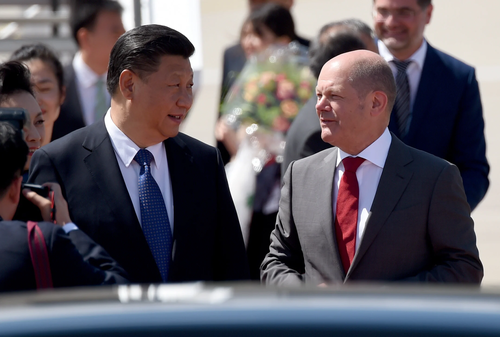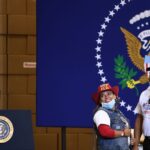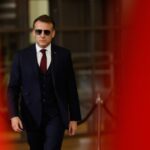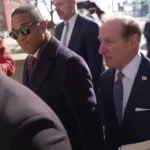
During a Monday virtual meeting between Chinese President Xi Jinping and German Chancellor Olaf Scholz, Xi stressed that Europe must play an active role in promoting peace talks, and in "building a balanced, effective and sustainable European security framework," according to China's state media.
Xi said "all efforts must be made to avoid the intensification and expansion of the Ukraine conflict, and China welcomes all efforts that are conducive to promoting peace talks," according to a translation. "China welcomes all efforts of the international community that facilitate the ceasefire and negotiations, the relevant parties should support Russia and Ukraine in reaching peace through negotiations," the Chinese leader said further.

Since nearly the start of the conflict, Washington has charged that Beijing is providing behind-the-scenes support for Russia's invasion of Ukraine, something which Chinese officials have consistently denied. China has also come under fire for appearing to provide political cover in its criticisms of NATO which echo the Russian position.
Cui Heng, an assistant research fellow from the Center for Russian Studies of East China Normal University, was featured in China's state-run English daily Global Times as describing Beijing's perspective that time is running out on Washington's muscular efforts at arming and propping up Ukrainian forces amid the Russian onslaught. This is why new pressure has been put on America's European allies to step up and do more, even as China argues they must get serious about negotiations and compromise.
"Cui said the growing pressure and sanctions by the US and its allies showed that the West was anxious to defeat Russia, especially as the Biden administration is facing huge pressure over a weakening domestic economy and hefty financial aid for Ukraine, knowing that getting deeper into the mire of the Russia-Ukraine conflict would harm its domestic midterm election prospects," GT states.
"On the other hand, Wang said with its support for Ukraine stretched to the limit, the US was in urgent need of its allies to demonstrate their commitment to the cause, and help its military sector continue making money from sending weapons to Ukraine," the report adds.
Meanwhile China's ambassador to Russia Zhang Hanhui in fresh remarks Monday announced China will boost ties with Moscow in the areas of military technology, energy, as well as in space. The South China Morning Post quotes him in the following:
In an interview with Russian state news agency Tass, Zhang Hanhui said energy had been the “most important, fruitful and extensive area of pragmatic cooperation between Russia and China”. He said such cooperation would be strengthened but – as Europe tries to reduce its dependence on Russian fuel – Zhang stopped short of promising to buy more oil and gas from Russia.
Zhang said there were difficulties in bilateral trade with Russia but the two sides would enhance settlements in their national currencies to ensure stable trade that they hoped would reach US$200 billion by 2024.
As for the prospect of a Russia-Ukraine ceasefire, by all appearances Washington doesn't seem interested in pushing for robust talks or diplomatic engagement with Moscow. Instead it is openly on record as saying it wants to see a "weakened" Russia, according to the recent words of Defense Secretary Lloyd Austin.
Below: Beijing has consistently sided with Kremlin condemnations of NATO expansion, saying this is a key part of Russia's legitimate security concerns...
Russian President #VladimirPutin "calmly but firmly" stated that #NATO created "absolutely unacceptable threat" in restrained V-Day speech, which Chinese analysts said sent a signal to West… https://t.co/pdL8ESwxBk
— Global Times (@globaltimesnews) May 9, 2022
Official communications are even to the point of Russia's ambassador to D.C. Anatoly Antonov saying he's had zero contact with Biden administration officials, describing it as a situation of being "blockaded".
“Frankly, we are in a blockade,” Antonov said late last month. “When I came to Washington, my idea was to use the word ‘improvement’ to describe his goals for the relationship. Now I prefer to use the word ‘stabilization.'”
During a Monday virtual meeting between Chinese President Xi Jinping and German Chancellor Olaf Scholz, Xi stressed that Europe must play an active role in promoting peace talks, and in “building a balanced, effective and sustainable European security framework,” according to China’s state media.
Xi said “all efforts must be made to avoid the intensification and expansion of the Ukraine conflict, and China welcomes all efforts that are conducive to promoting peace talks,” according to a translation. “China welcomes all efforts of the international community that facilitate the ceasefire and negotiations, the relevant parties should support Russia and Ukraine in reaching peace through negotiations,” the Chinese leader said further.

Since nearly the start of the conflict, Washington has charged that Beijing is providing behind-the-scenes support for Russia’s invasion of Ukraine, something which Chinese officials have consistently denied. China has also come under fire for appearing to provide political cover in its criticisms of NATO which echo the Russian position.
Cui Heng, an assistant research fellow from the Center for Russian Studies of East China Normal University, was featured in China’s state-run English daily Global Times as describing Beijing’s perspective that time is running out on Washington’s muscular efforts at arming and propping up Ukrainian forces amid the Russian onslaught. This is why new pressure has been put on America’s European allies to step up and do more, even as China argues they must get serious about negotiations and compromise.
“Cui said the growing pressure and sanctions by the US and its allies showed that the West was anxious to defeat Russia, especially as the Biden administration is facing huge pressure over a weakening domestic economy and hefty financial aid for Ukraine, knowing that getting deeper into the mire of the Russia-Ukraine conflict would harm its domestic midterm election prospects,” GT states.
“On the other hand, Wang said with its support for Ukraine stretched to the limit, the US was in urgent need of its allies to demonstrate their commitment to the cause, and help its military sector continue making money from sending weapons to Ukraine,” the report adds.
Meanwhile China’s ambassador to Russia Zhang Hanhui in fresh remarks Monday announced China will boost ties with Moscow in the areas of military technology, energy, as well as in space. The South China Morning Post quotes him in the following:
In an interview with Russian state news agency Tass, Zhang Hanhui said energy had been the “most important, fruitful and extensive area of pragmatic cooperation between Russia and China”. He said such cooperation would be strengthened but – as Europe tries to reduce its dependence on Russian fuel – Zhang stopped short of promising to buy more oil and gas from Russia.
Zhang said there were difficulties in bilateral trade with Russia but the two sides would enhance settlements in their national currencies to ensure stable trade that they hoped would reach US$200 billion by 2024.
As for the prospect of a Russia-Ukraine ceasefire, by all appearances Washington doesn’t seem interested in pushing for robust talks or diplomatic engagement with Moscow. Instead it is openly on record as saying it wants to see a “weakened” Russia, according to the recent words of Defense Secretary Lloyd Austin.
Below: Beijing has consistently sided with Kremlin condemnations of NATO expansion, saying this is a key part of Russia’s legitimate security concerns…
Russian President #VladimirPutin “calmly but firmly” stated that #NATO created “absolutely unacceptable threat” in restrained V-Day speech, which Chinese analysts said sent a signal to West… https://t.co/pdL8ESwxBk
— Global Times (@globaltimesnews) May 9, 2022
Official communications are even to the point of Russia’s ambassador to D.C. Anatoly Antonov saying he’s had zero contact with Biden administration officials, describing it as a situation of being “blockaded”.
“Frankly, we are in a blockade,” Antonov said late last month. “When I came to Washington, my idea was to use the word ‘improvement’ to describe his goals for the relationship. Now I prefer to use the word ‘stabilization.’”







